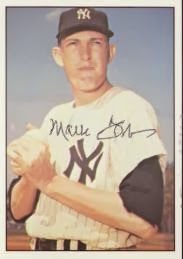Mark Freeman graduated from Memphis' Christian Brothers High School in 1948 where he lettered in baseball and basketball, and was an All-State baseball pitcher. He was awarded a baseball/basketball scholarship to LSU.
Freeman signed a contract with the Yankees in 1951 and began his pro career but he continued his education and received his degree from LSU in 1953. Meanwhile he had begun a seven year climb towards the majors taking a nearly two season detour to serve in the U.S. Army as a First Lieutenant and Sports Officer and manager of Ft. Jackson baseball team at Ft. Jackson, South Carolina.
He returned to civilian life and baseball in 1956 and was a double digit winner for three straight seasons in Denver where the Yanks had their AAA club. While there he established team marks for season strikeouts and shutouts.
On the eve of the 1959 season he was traded to the Kansas City Athletics and made it into three April games as a reliever for them. In mid-May he was returned to the Yanks. I cannot find anything to suggest why and given the history of the Athletics and Yankees during the 1950s it was likely another on of those deals of convenience for New York. The Yanks sent him to pitch in Seattle of the PCL and he had another fine AAA season there including a no-hitter. In September the Yanks activated Freeman and he capped his tumultuous season with a start at Yankee Stadium against the Orioles. He pitched seven innings allowing only six hits and two runs while fanning four. He left with the game tied but the Yanks lost it in 11 innings.
He was back in the minors to open 1960 but the Yanks dealt him to the Cubs in May and he spent the rest of that season pitching in the National League. He made eight starts over 30 appearances and went 3-3 with his only career save.
He retired to Denver, Colorado after that season to work full time in the mutual funds business which he had dabbled in for the last several years of his baseball career. He was a very successful business man and established an endowment fund for supporting the tutoring of student athletes at LSU in 2003.
His LSU bio (he was alum of 'distinction') mentions that he was founded and served as President of the Denver Broncos Quarterback Club (their official booster club).
His card shows him in a spring training shot with a retouched cap featuring the Athletics' logo but untouched Yankee pinstripes. I came across several versions of a story that goes like this:
Once, during a game when Mark Freeman was pitching for the New York Yankees, a bee buzzed his head and he balked. Casey Stengel, the Yankee manager, told him: "Next time ... swallow it."Volume 4 of the Baseball Hall of Shame series of books contains the same story but stated the game was played against the Tigers.
Two problems with this. First of all Freeman never pitched for the Yanks against the Tigers. His only game was that September '59 start against the Orioles. And second of all, according to Baseball reference game summaries he never committed a balk. Not in his big league career anyway.
My guess? It was a spring training game or it's a story that somehow evolved from some other incident and mutated in the retelling. With Casey Stengel stories that's very possible.
Here he is in his Yankee gear, unblemished by the Topps artist's brush and another spring camp shot in which he warms up while Stengel watches closely.
And here he is as a businessman years later:
Freeman died in 2006.







The number of transactions between the Yankees and KC A's prior to Charlie Finley buying the latter franchise is a bit overwhelming, but I think many people have misconstrued who was getting the better of whom. In short, despite (not unreasonable) perceptions that NY treated the A's the same way they treated the Blues, neither club got the better of the other.
ReplyDeleteMost of the transactions between the two team were for bit players - the A's simply didn't have much to offer and the Yankees repaid them in kind. Some of the relatively bigger names (e.g., Bud Daley) who the Yanks acquired didn't actually benefit them. The most famous/notorious trade was after the '59 season, when the Yankees acquired Roger Maris for a young Norm Siebern and and an old Hank Bauer (there were a couple of other players in the trade, but they weren't of any consequence). Yes, Maris won the '60 and '61 AL MVP awards and broke Ruth's single season HR record, but Siebern had an excellent run in Kansas City and Bauer became the A's manager (before he led the Orioles to considerable success). The A's were no worse without Maris than they were with him, and Maris benefited greatly from being in the middle of the excellent Yankee lineup.
Great insights. Thanks for contributing. I've had this book on my shelf for quite awhile and just have not had the time to read it. The relationship between the two clubs id interesting to say the least.
DeleteHere's a good analysis of the trades. Thanks to the Maris and Clete Boyer deals, the Yankees got the better end in terms of WAR, but otherwise, the transactions were pretty meh (and, again, getting Siebern and Bauer for Maris wasn't a bad exchange). Regardless, the A's would have stunk even if those trades never occurred.
ReplyDeletehttp://www.royalsreview.com/2010/7/12/1565414/valuing-trades-between-the-kansas